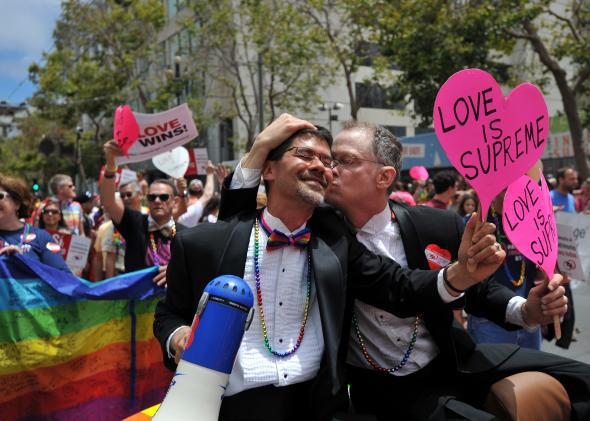David Leonhardt and Alicia Parlapiano at the New York Times’ Upshot blog have a piece comparing growing support for gay marriage with trends in support for abortion rights, which has remained relatively steady, with occasional ebbs and flows. (They also look at other issues, but the centerpiece is gay rights versus abortion rights.) Their argument is that anti-discrimination causes tend to garner broad support over time, while issues that are framed as a matter of competing rights become permanently controversial. “People who favor abortion rights can point to a woman’s right to control her body; people who oppose abortion can point to a fetus’s right to live,” they argue. In contrast, arguments that same-sex marriage does harm to straight people “lacked any evidence.”
It’s a tempting theory, but I have to express skepticism. For one thing, the two data sets they’re comparing don’t really compare. The growth in support for gay marriage is all measured in the years prior to the Supreme Court awarding that right, and the data showing steady support for abortion rights starts in 1975, after Roe v. Wade.
We don’t yet know if support for gay marriage will keep growing. Leonhardt and Parlapiano’s main evidence that support for minority groups expands over time is polling data showing people are more willing to vote for a black person, woman, or member of a religious minority as president than they used to be. That’s not really the best measure. Sure, it demonstrates how willing people are to be overtly racist or sexist—which is not nothing, to be fair—but, as we have all experienced, your average bigot rarely admits to holding bigoted beliefs. A better measure of racism in this country is support for voting restrictions or support for police brutality against people of color than a hypothetical question of whether they’d vote for a black president.
This matters. Although abortion is frequently treated in the media as a struggle between bodily autonomy and fetal life, the reality is that debate has little to no real impact on how people feel about the issue. Your opinion on legal abortion is far more likely to be shaped by your attitudes about gender equality and sexual freedom than about how you feel toward embryonic cells. If abortion really were a debate over life versus bodily autonomy, you’d see people all over the political map struggle with this. In the real world, the issue is starkly partisan, and it’s an easy way for Republicans to ensure the loyalty of a religious-right base that sees anti-abortion activism as the linchpin of a larger movement to impose their beliefs about gender and family on the rest of the country.
It’s not a coincidence that the people who are angriest about this gay marriage decision also tend to be the people who are most stalwart in the war against reproductive rights. The thread that ties the two together is a rigid belief in traditional gender roles, namely that the husband is the head of household and the wife should have children and serve her family. Gay marriage and reproductive rights both threaten that ideal, and that’s where the opposition comes from.
Yes, there’s a huge mushy middle of Americans who are ambivalent about abortion rights. That’s because Americans are ambivalent about women’s equality. For instance, research shows that support for abortion rights depends quite a bit on whether the woman is adhering to gender norms. Getting an abortion to complete high school, for instance, gets a lot more support than getting an abortion because you don’t want to get married.
Certainly, there’s good reason to hope that American support for gay marriage will continue to expand. But that has more to do with the fact that it’s a simpler issue than abortion, which produces a lot of complex feelings and opinions. But the fight for gay rights is far from over. As nice as it would be to declare victory and go home, I fear that gay rights activists—and, of course, abortion rights activists—still have a hard road ahead.
